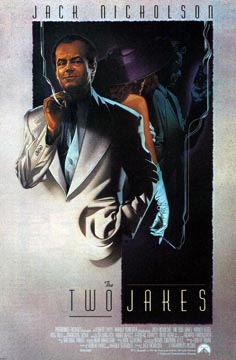
Welcome to the next CHUD List.
We’ve
tackled our essentials list and the continued revelation of our Kills
List from 2003, and now that we’ve begun the beguine, we must continue.
Behold:
The CHUD.com Top 50 Disappointments.
A
quick word on the criteria. We could very easily have spent this whole
article discussing sequels and prequels and adaptations of television
shows and called it a day. Instead, we tried to go a different route.
Also, from a master list of over 100, the involved parties (Devin,
Jeremy, Micah, Russ, and myself) all killed off a choice for each one
we claimed. As a result, we’ll run a big list at the end of this of the
‘ones that got away’. So, here is day one of many where we chronicle
the 50 Biggest Disappointments. Two a day, every week day for five
weeks. In no particular order: #12 – The Two Jakes (1990, dir. Jack Nicholson)
#12 – The Two Jakes (1990, dir. Jack Nicholson)
First, let me say this. I kind of love this movie. It came out when I was a projectionist at the Roswell Mall Cinema and I remember fighting with my friends over which of the movies opening that weekend [Air America and Flatliners] we should see first. "The glorious one", I fought. It was the goddamned sequel to Chinatown written by Robert Towne and starring Jack Nicholson riding high on his Batman cred. Plus, he directed the thing, a title he hadn’t wore since the seminal Goin’ South. I told them it wasn’t just the most important movie of the weekend, it was the most important one of the year. I won the fight but I lost the war.
As I roused my buddies from the deep slumber they entered from watching The Two Jakes, I was quickly reminded that I was an asshole for depriving my pals of Downey/Gibson/Thomerson action and/or Oliver Platt’s "Pussy Maraduer" line by choosing the eternal [only 137 minutes?] Nicholson flick. It is slow. Slower than snail shit. Slower than Don Ameche on the crapper. Slower than Rob Schneider’s fan base. It’s not a good slow, either. Chinatown‘s not exactly Crank. It’s exquisitely paced, rich and deliberate. The Two Jakes is fat, in some ways a typical 90’s sequel. It believes that its audience is so enamored of its characters and subject matter that it can withstand a rather humdrum story that moves to oil from the original’s water as the source of conflict. Thankfully, the performances are stellar, and Nicholson is a joy to watch back in ol’ Jakes Gittes’ shoes, but even if this wasn’t a continuation of a brilliant and vital story it’d have been a leaden affair for most and a letdown. That it’s the next Chinatown scuttled both its chances for a lucrative run in theaters but also a foothold in film history. It’s not a major affront, just a huge misuse of an opportunity. Not as huge a mind-killer as Grease 2 or Breakin’ 2, but certainly not The Empire Strikes Back of backlot intrigue.
Still, I love it. Any film where Jack Nicholson’s romantic tactics involve telling a girl to put "her ass in the air" can’t be all bad but forget it, folks. It ain’t Chinatown.
Travesty Scale (1-10): 8 out of 10
 #11 – Cleopatra (1963. dir. Joseph L. Mankiewicz)
#11 – Cleopatra (1963. dir. Joseph L. Mankiewicz)
Sometimes disappointing movies bum you out. Sometimes they almost sink a whole studio and send the movie business into a panic. Such a disappointment was Cleopatra.
An up front confession: I was never personally disappointed by Cleopatra, since I saw it for the first time on DVD a couple of years back, and I was expecting it to be incredibly bad – ie, to live up to the reputation as the movie that almost broke Fox. It was bloated and paced poorly, and the acting is so often over the top that it seems like most of the movie’s insane budget (250+ million in today’s dollars) went to restoring sets that were eaten by the likes of Richard Burton, but I found the movie to be often very beautiful and I liked the shaggy looseness that came from actors essentially improving their way through a period epic.
Cleopatra is a very modern film in that the making of it dominated headlines across the world – originally budgeted at 2 million dollars, it was at 7 million when director Rouben Mamoulian left with no usable footage, as his Marc Antony and Julius Caesar had to leave the film for other commitments. Joseph L Mankiewicz was brought in, and with him came Richard Burton. Burton’s on-set affair with star Elizabeth Taylor became THE gossip story of the decade, making them the original Brad and Angelina. Fox kept throwing money at the movie, thinking it would be An Important Film, despite the fact that there just was no script.
After all the hype and excitement, Cleopatra landed with a very loud but not profitable thud. It made 48 million dollars, and became the highest grossing movie of the year, but Fox’s take of 22 million barely covered half the costs. And while everybody went to see the movie, nobody liked it (yet again making Cleopatra the forerunner of modern blockbusters which open big and then sink away). Mankiewicz had delivered a six hour cut but Fox trimmed the movie down to three hours, eradicating huge chunks of the plot and making characters mysteriously appear and disappear (Martin Landau’s character of Rufio dies suddenly and apparently for no reason; Marc Antony’s men also do a disappearing act before the final battle); supposedly Elizabeth Taylor was so upset with this truncated cut that she puked after seeing it. There’s a four hour cut on DVD now, but the full six hours are forever lost, so there’s no way to know if Mankiewicz ever managed to deliver anything living up to the monstrous hype (although it’s incredibly doubtful, and being fair to the guy who made classics like All About Eve it’s amazing that there’s any version of this film that’s watchable after everything that happened behind the scenes).
Fox came very close to falling apart after Cleopatra – the only reason there is such a place as Century City in Los Angeles today is because the studio had to sell off most of their backlot to stay afloat. The film really killed the studio system in that the studios were less likely to take the big chances alone, and began working with independent partners. And Cleopatra signaled the beginning of Hollywood’s inability to connect with the moviegoing public anymore; the freedom afforded the filmmakers of the 70s was a direct result of Hollywood being this out of touch – they’d try anything to get asses in seats after a string of disasters.
Forty years after Cleopatra, the lesson that Hollywood learned is to make your money back in ancillary streams – TV sales, DVD sales, foreign and licensing, for example – but not to make good movies on reasonable budgets. Cleopatra’s not just disappointing as a big film packed with talent that should have been better, it’s disappointing as a wake up call that Hollywood eventually learned to ignore. – Devin
Travesty Scale (1-10): 4 out of 10
Previously Disappointing:
- The Ladykillers
- Once Upon a Time in Mexico
- Bram Stoker’s Dracula
- Ultraviolet
- New York, New York
- Billy Bathgate
- Star Trek: The Motion Picture
- Willow
- Superman Returns
- Blade: Trinity
- Art School Confidential
- Lifeforce
- Bonfire of the Vanities
- Exorcist: Dominion
- The Black Hole
- Harlem Nights
- The Last Castle
- Ghostbusters II
- Love on the Run
- Full Frontal
- Celebrity
- Alien Resurrection
- Dune
- From Hell
- Hook
- The Replacement Killers
- Godzilla (1998)
- Tideland
- Dogma
- Reindeer Games
- Rosewood
- The Good German
- World Trade Center
- The Cotton Club
- Mission: Impossible II
- A Life Less Ordinary
- The Two Jakes
- Cleopatra
Official Message Board Discussion.